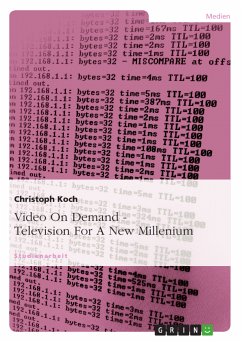Seminar paper from the year 1994 in the subject Communications - Movies and Television, grade: B+, University of Amsterdam, language: English, abstract: In the following l want to discuss the effects the interactive television technology might have on the 'Information society' and which tasks have to be fulfilled to become a member of it. l want to focus on the question, what are the advantages to be a 'member' of such a society and what advantages these technologies offer? My task is not to find a definite answer to these questions. They must be seen as speculative ones. All the new communication technologies like interactive television, are just at the beginning of its 'booming' development and there is no empirical research done on it yet. However, want to take the interactive television technology as an example to discuss, what opportunities this new technology offers. Therefore, my work is primarily a theoretical approach to an issue that will become even more important if the new System will knock on the door of private households in Europe. l also want to discuss some ideas of Bertolt Brecht, who already in the 1920's made suggestions for interactive broadcasting, which were primarily concerned about the radio system. But nevertheless his ideas are still applicable on any other communication system. His ideas of interactivity are more relevant than ever.1 The industry took on this argument for their own purposes. They Claim, that interactive television is absolutely necessary, because the Computer generation is raised with interactivity. Video games are one the best examples for interactivity. As well as the latest information l collected from newspapers, l will also use magazines and other media.
Dieser Download kann aus rechtlichen Gründen nur mit Rechnungsadresse in A, B, BG, CY, CZ, D, DK, EW, E, FIN, F, GR, HR, H, IRL, I, LT, L, LR, M, NL, PL, P, R, S, SLO, SK ausgeliefert werden.









